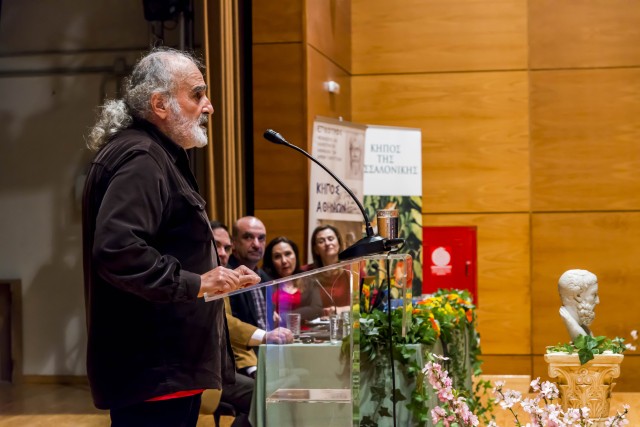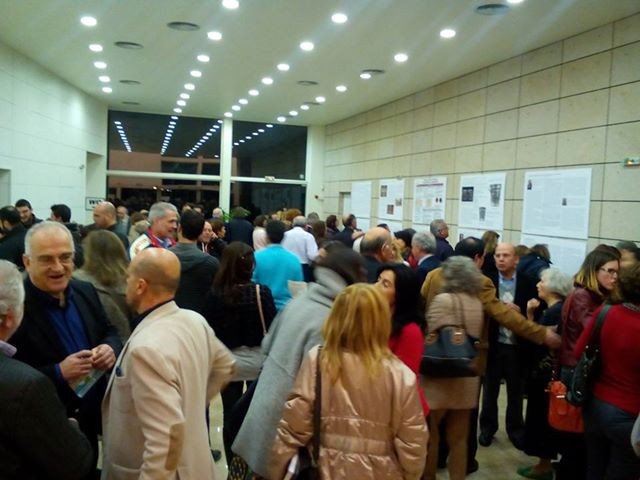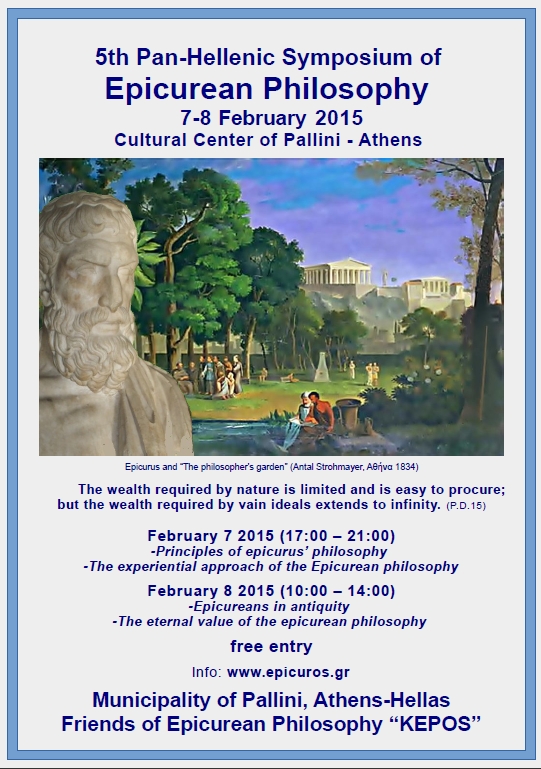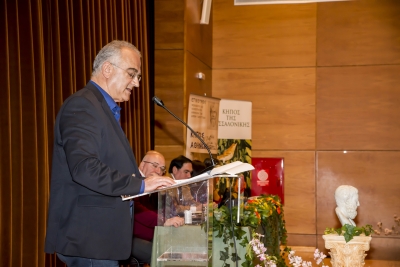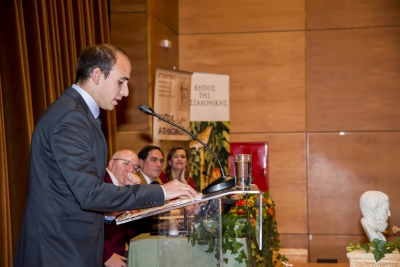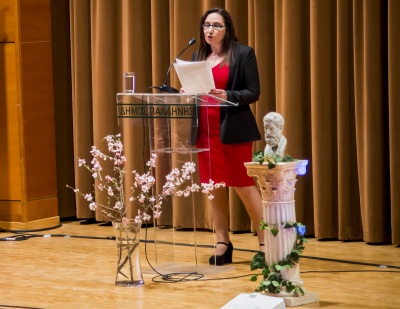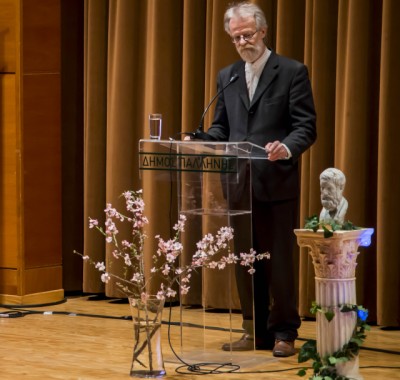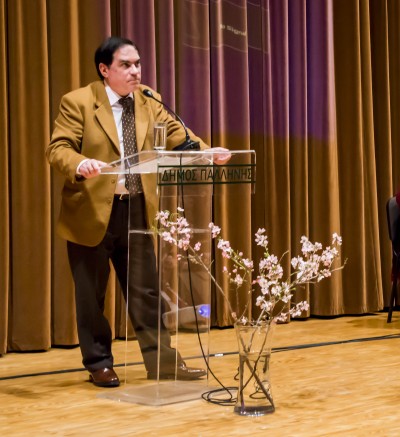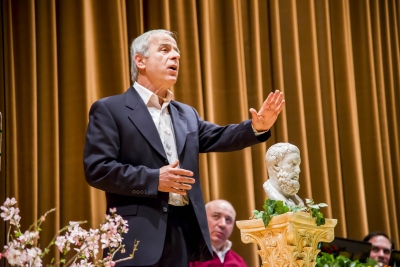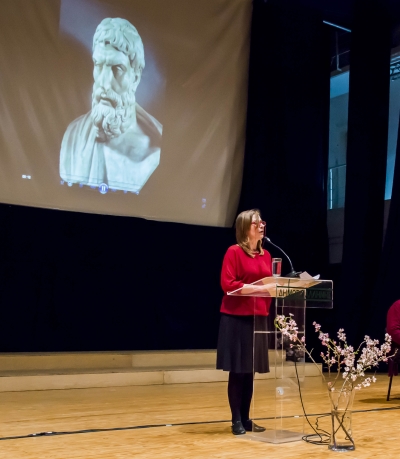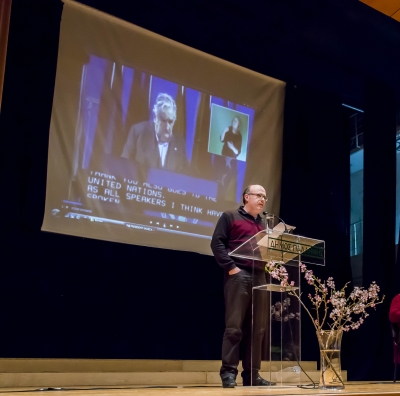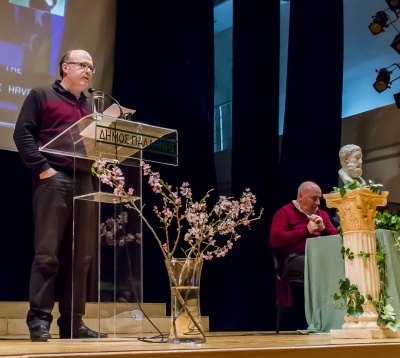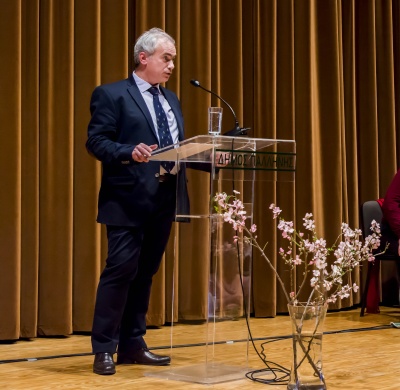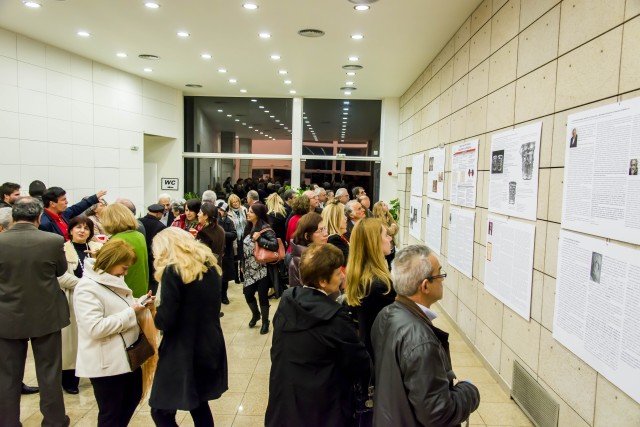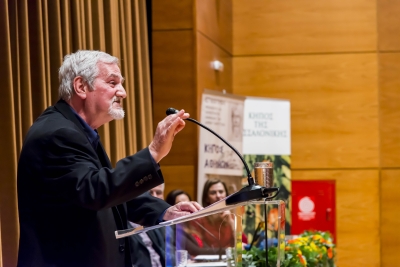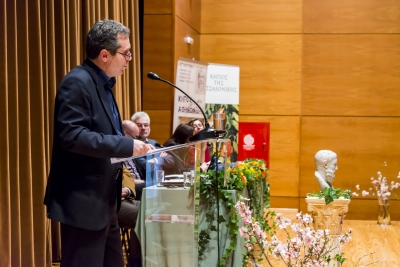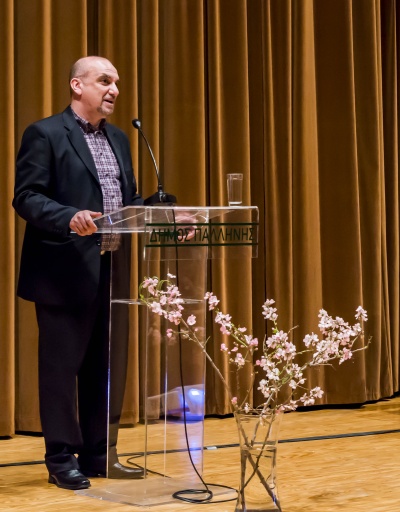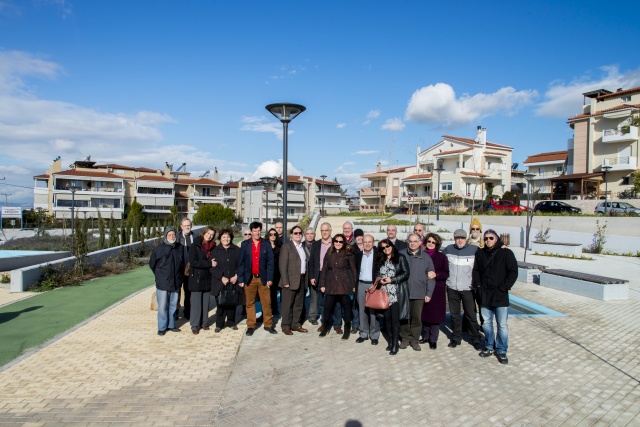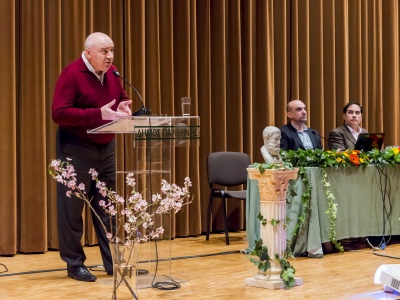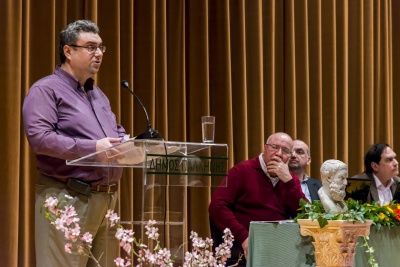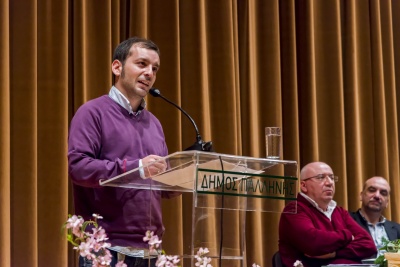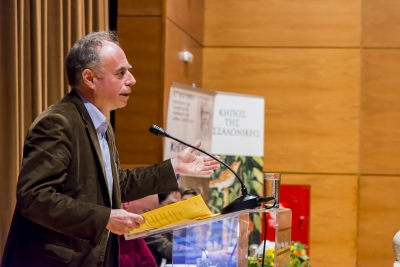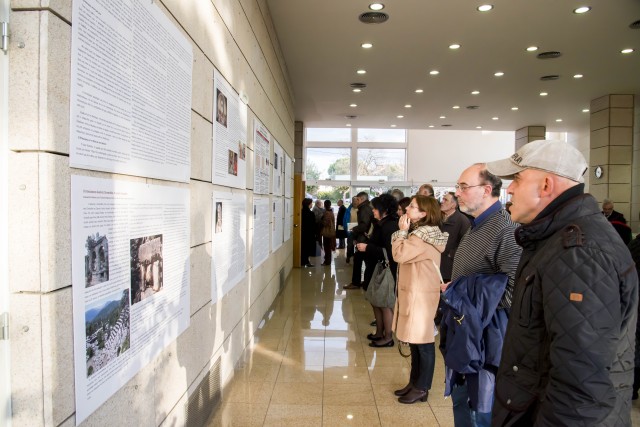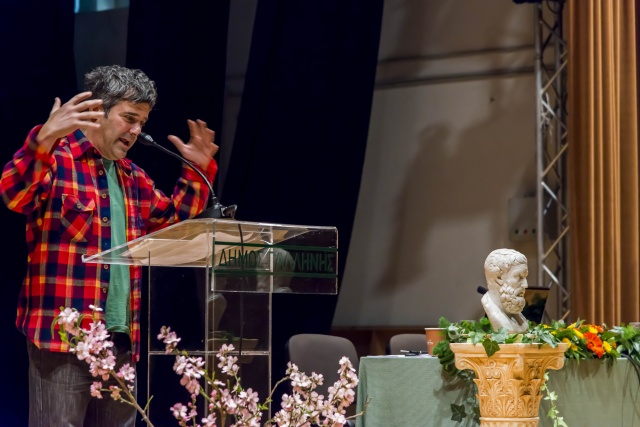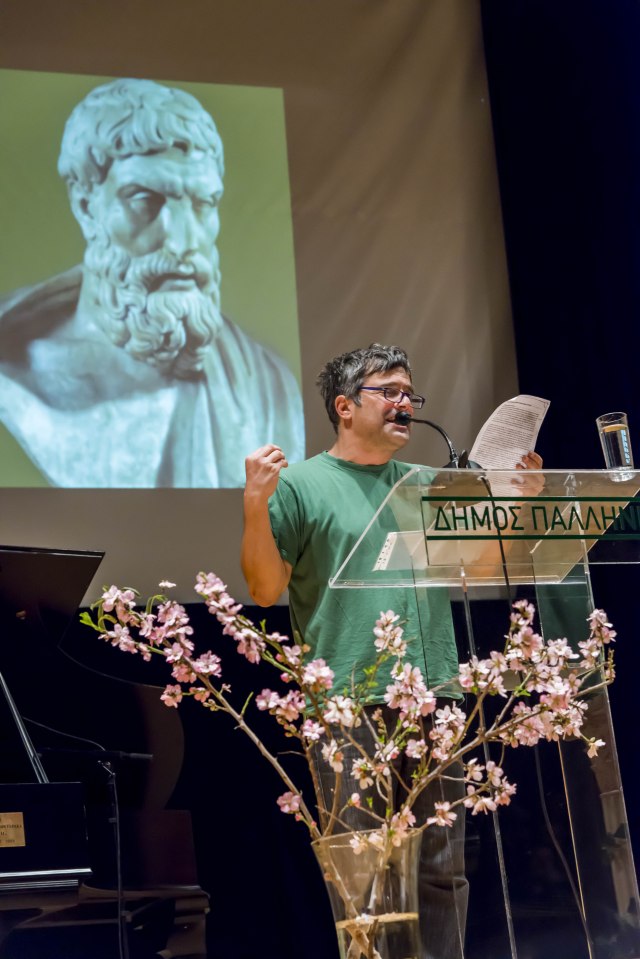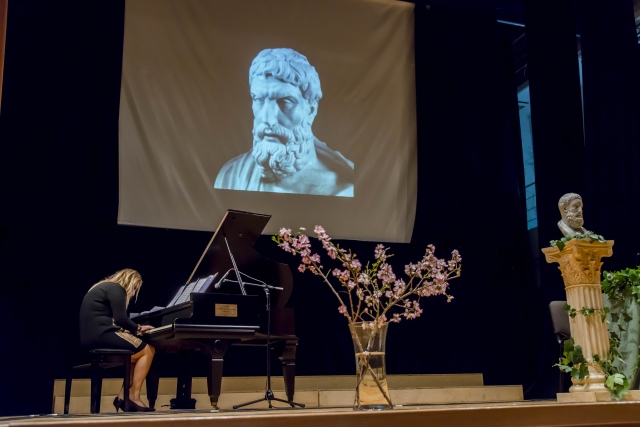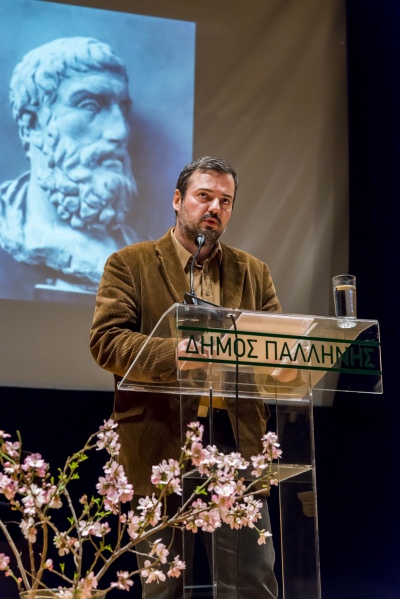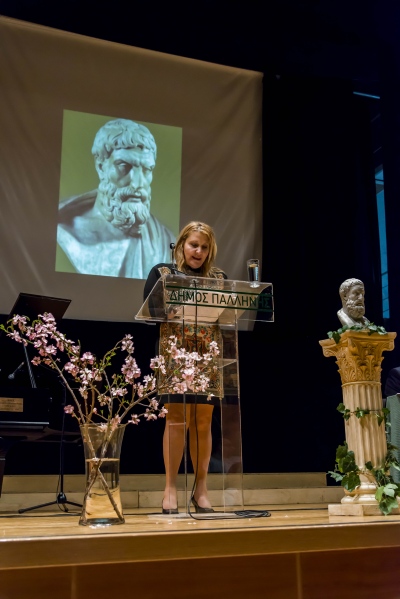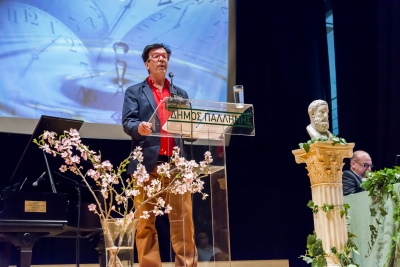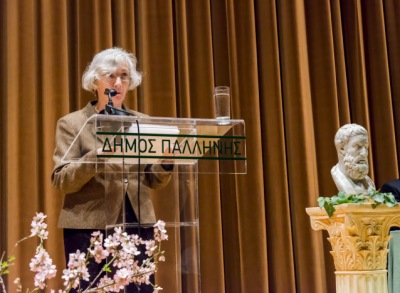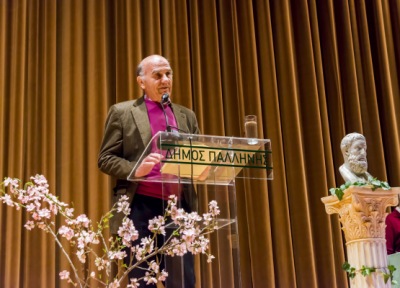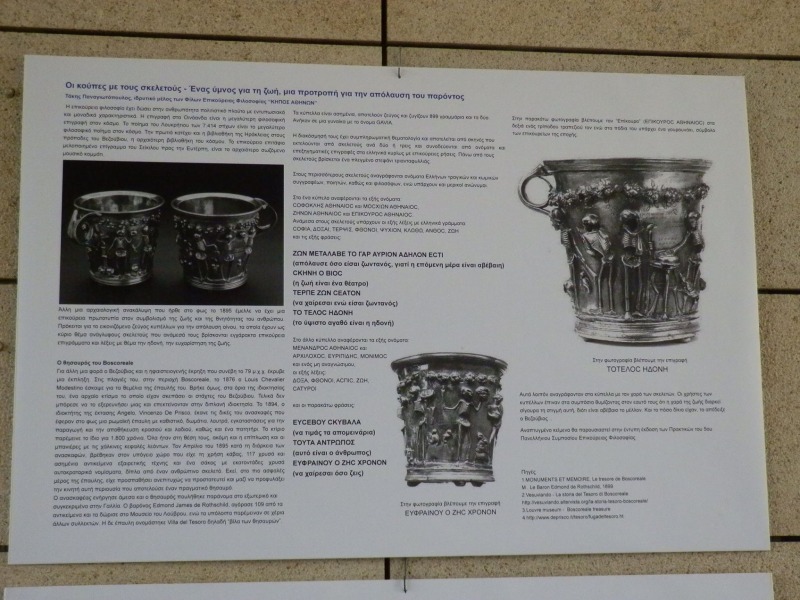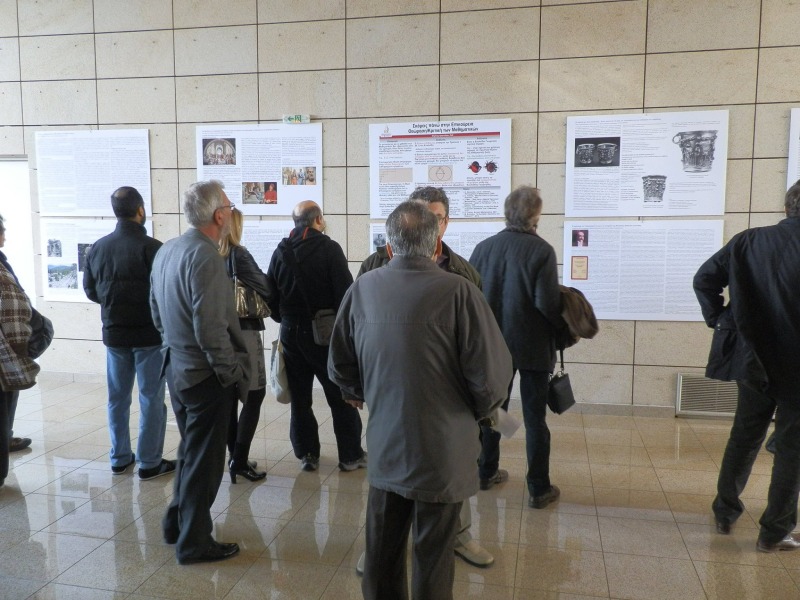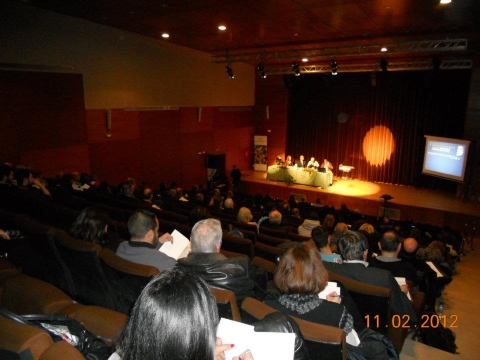
|
Contact us ideoszen@gmail.com .... Official Site in greek language www.epicuros.gr Panhellenic Symposium of Epicurean PhilosophyThe Symposium is a tribute to our master Epicurus. The Symposium is organized, with free entrance, every year in February by the Friends of Epicurean Philosophy, because Epicurus was born in that month, and always in Pallini, because that particular municipality of modern Athens metropolitan area includes the ancient Athenian demos of Gargettus, from which Epicurus originated. 6th Panhellenic Symposium of Epicurean Philosophy February 6-7, 2016, Cultural Center of Pallini, Athens Free entrance February 6, 2016 THE PHILOSOPHY OF EPICURUS
1.PRINCIPLES OF EPICURUS PHILOSOPHY
2. EPICUREAN POSITIONS ABOUT GOD
Interval: Viewing of Posters Poetry meets Music: Epicurean poet C.P. Cavafy & Composer A. Simoglou ('Ithaca', 'To Call Up the Shades', 'Growing in Spirit' 3. EPICUREAN INFLUENCES IN UTILITARIANISM
3. EPICUREAN POSITIONS ABOUT JUSTICE
Discussion: The necessity for justice today Actual symposium (dining and drinking) in a local tavern with music February 7, 2016 EPICUREAN PHILOSOPHY FROM ANTIQUITY TO OUR TIMES 5. THE EXPERIENTIAL APPROACH OF THE EPICUREAN PHILOSOPHY
Interval: Viewing of Posters Music Interval : Selected piano works 6. EPICUREAN HISTORY
7. THE ETERNAL VALUE OF THE EPICUREAN PHILOSOPHY
Discussion: Individual and society Poster
5th Pan-Hellenic Symposium of Epicurean Philosophy Report February 7-8, 2015 - Cultural Center of Pallini, Athens - Free entrance For the fifth consecutive year since 2011, about 400 people from all over Greece, the largest ever sum of participants, gathered at the Cultural Center of Pallini in Athens in order to attend the two-day Pan-Hellenic Symposium of Epicurean Philosophy. The Symposium is organized, with free entrance, by the Friends of Epicurean Philosophy Garden of Athens and Garden of Thessaloniki under the auspices of the Municipality of Pallini. The Pan-Hellenic Symposium of Epicurean Philosophy takes place every year in February, because Epicurus was born in that month, and always in Pallini, because that particular municipality of modern Athens metropolitan area includes the ancient Athenian demos of Gargettus, from which Epicurus originated.
The 5th Pan-Hellenic Symposium of Epicurean Philosophy was a great success and took place in a warm friendly atmosphere, despite the cold weather. There were two sessions on the first day and two sessions on the second day of the Symposium with 19 oral presentations, two discussions, 10 poster presentations, as well as three artistic intervals.
During the opening session of the first day on Saturday, February 7, 2015, the speech of the Mayor of Pallini Athanassios Zoutsos was applauded enthusiastically by all participants. The Mayor announced that the development of a green area of 5000 square meters, named Garden of Epicurus, was completed and will include initially a bronze relief sculpture offered by the renowned sculptor Aspasia Papadoperaki, a member of The Garden of Athens, and in the future a statue of the philosopher, and a wall with some of his Principal Doctrines. In addition, he said that a website with the Declaration of the Right of Happiness in the European Union will be launched within a month initiating a campaign of collecting signatures in order to bring the issue to the EU parliament. The Mayor also announced the publication funding of a book of Proceedings in english which will include the 40-50 best presentations of the first five Pan-Hellenic Symposia of Epicurean Philosophy, edited by members of the Garden of Athens.
Following the initial greetings of representatives from the Greek Gardens, the audience experienced the formation of a world-wide bridge of friendship, with the moving salute from the Consul Sienra on behalf of President of Uruguay Jose Mujica, and cordial greetings from Hiram Crespo (International Society of Friends of Epicurus), Geoff Petersson (Garden of Sydney, Australia), and Cassius (newepicurean.com, USA). Session 1 PRINCIPLES OF EPICURUS PHILOSOPHY started with some parts of the Letter to Menoeceus written in verses by poet Thanassis Yapijakis and beautifully recited by actor Giorgos Klonis. Then, the presentations Life of Epicurus and The philosophy of Epicurus covered a broad introduction for those attendants with limited knowledge of Epicurus and his philosophy. The topics of Multi-valued logic of Kostas Karderinis and Manifold way of Dimitris Altas discussed extensively the free and multileveled Epicurean way of thinking.
The actor George Klonis As an example of how the Epicurean philosophy may affect political thinking and realistic policies in the modern world, the video of the inspired speech of President of Uruguay Jose Mujica in Rio de Janeiro (Brazil) at the 2012 Earth Summit was presented and enthusiastically applauded by the Symposium attendants. Session 2 THE EXRERIENTIAL APPROACH TO EPICUREAN PHILOSOPHY started with presentation Free will according to Epicurus of Christos Yapijakis who discussed the philosophical orientation of Epicurus' thoughts on the matter, as well as in brief the current scientific knowledge regarding chance in nature and regarding human conscience. Two more presentations covered the topics The value of Epicurean reciprocity in our modern era by Dimitris Dimitriadis and The Epicurean philosophy as the peak of Hellenism by Dimitris Liarmakopoulos, followed by Presentation of Publications and Websites of Greek Gardens by Takis Panagiotopoulos who discussed the over one thousand pages worth of greek books published by the Friends of Epicurean Philosophy in the last four years, as well as the wealth of information in greek websites epicuros.gr and epicuros.net. The Session was followed by scenes from a new movie Orpheus: How not to speak by the reknown director Theodoros Marangos, which features the misery and lack of philosophical knowledge of average modern Greeks. Finally, a live discussion on The experiential today and tomorrow of Epicurean philosophy kept the audience until 10 pm, when it was interrupted so that the Friends of Epicurean Philosophy could participate in an actual symposium with dining, drinking, and dancing in a nearby taverna named Aristoteles.
The director Theodoros Marangos On Sunday, February 8, 2015, the Mayor of Pallini Athanassios Zoutsos and the Friends of Epicurean Philosophy visited the area Garden of Epicurus and discussed plans for its future development. Session 3 EPICUREANS IN ANTIQUITY started with The Epicurean naturalistic approach of gods by Giorgos Bakogiannis that presented the atomic reality of gods according to Epicurus, Velleius, Philodemus, and Lucretius. The following presentations focused mainly on the Epicurean philosopher who became famous from the Herculaneum papyri: Philodemus, the Epicurean philosopher by Pavlos Kopakas, Philodemus' On signs by Panagiotis Papavassiliou and On wealth by Giorgos Kaplanis. The Session was followed by an artistic interval in which the famous actor Gerassimos Gennatas read most vividly the Letter to Menoeceus and Litsa Pitsikali (a member of The Garden of Athens) played some selected piano pieces.
The actor Gerassimos Gennatas
Litsa Pitsikali The final Session 4 THE ETERNAL VALUE OF THE EPICUREAN PHILOSOPHY included presentations such as Epicurean philosophy and philanthropy, an inspired speech by professor of Applied Ethics Evangelos Protopapadakis, Empiricism as a continuation of Epicurean philosophy by Litsa Pitsikali, Time and Epicurean worldview a comprehensive presentation by Babis Patzoglou, The eternal importance of Epicurean philosophy by Aspasia Papadoperaki, and finally Epicurean socialization: family and social justice by Themis Michos. The following discussion What we learned in this Symposium stirred the audience about several issues. Mostly the issue of the belief in gods was lively discussed with everyone agreeing that Epicurus and most ancient Epicureans believed in the existence of gods, and that all modern Epicureans tend to agree in lack of divine providence and in religious freedom of people, just like the Epicurean Thomas Jefferson first established in USA. From the ten poster presentations, that were viewed during the intervals of the Symposium, the audience seemed to discuss more the following: - The president of Uruguay and philosopher politician Jose Mujica and his Epicurean influences by Babis Patzoglou and Takis Panagiotopoulos - Francis Wright, the Epicurean pro-women's rights and anti-slavery activist by Eleni Michopoulou and Christos Yapijakis - The cups with the skeletons: A hymn to life and a suggestion for enjoying the present by Takis Panagiotopoulos - Some thoughts on the Epicurean views and criticisms of mathematics by Michael Aristidou - How we find the figure of our master philosopher Epicurus in Raphael's The School of Athens by Elli Pensa
The Symposiun was a great success and was held in a friendly and delighful atmosphere. The only problem was that a friend from the Garden of Thessaloniki who usually video records the Symposia was gone unexpectedely ill so he did not attend, therefore only voice recording of the presentations and still pictures were taken. Delighted with the amazing weekend, the Friends of Epicurean Philosophy in Greece renewed their appointment for the 6th Panhellenic Symposium, next year in February 2016.
5th Panhellenic Symposium of Epicurean Philosophy Cultural
Center of Pallini, Athens Cultural Center
of Pallini, Athens. Program February 7, 2015 THE PHILOSOPHY OF EPICURUS
Interval:
Viewing of Posters 2. THE EXRERIENTIAL APPROACH TO EPICUREAN PHILOSOPHY
Scenes from the movie Orpheus: What to believe (director T. Marangos)
Discussion: The experiential today and tomorrow of Epicurean philosophy Actual symposium (dining and drinking) in a local tavern with music
February 8, 2015 EPICUREAN PHILOSOPHY FROM ANTIQUITY TO OUR TIMES Visit at the new site of Municipality of Pallini named The Garden of Epicurus
3. EPICUREANS IN ANTIQUITY
Interval: Viewing of Posters
Artistic Interval : The Letter to Menoeceus and selected piano works
The actor Gerassimos Gennatas read most vividly the Letter to Menoeceus
Litsa Pitsikali (a member of The Garden of Athens) played some selected piano pieces.
4.THE ETERNAL VALUE OF THE EPICUREAN PHILOSOPHY
Discussion: What we learned in this Symposium
Poster presentations 1. "The president of
Uruguay and philosopher politician Jose Mujica and his
Epicurean influences" 2. "Some thoughts on the
Epicurean views and criticisms of mathematics" 3. "Francis Wright, the
Epicurean pro-women's rights and anti-slavery activist"
4. "The cups with the
skeletons: A hymn to life and a suggestion for enjoying
the present" 5. "Diogenes of Oenoanda
and his great Epicurean inscription" 6. "How we find the
figure of our master philosopher Epicurus in Raphael's
The School of Athens" 7. "The Epicurean
philosophy on death" 8. "Epicurus: A
philosopher's stone of thoughts and discussion" 9. "Thoughts about
politics and Epicurus" 10. "The
depiction of the Epicurean philosophy in Vassilios
Antoniades' history of philosophy book (1910)"
The cups with the skeletons: A hymn to life and a suggestion for enjoying the present
End of 5th National Symposium of Epicurean Philosophy, Gargittos - Athens 2015 http://www.imerisia.gr/article.asp translated by Cassius Amicus: Vaso Michopoulou What is it that unites the most
humble leader of the world, the President of Uruguay Jose
Mujica, with the Municipality of Pallini and Friends of
Epicurean philosophy? The historic Declaration of the right of happiness in the European Union (Declaration of Pallini, Greece), written by Christos Yapijakis first in Greek and then in English. It was co-signed by a great number of 4th Pan-Hellenic Symposium of Epicurean Philosophy participants and it is currently translated in other European languages, so that it may be signed in the future by scores of Europeans who are interested in a better, happier future aiming to be heard by the European parliament. 4th Pan-Hellenic
Symposium of Epicurean Philosophy Report For the fourth time since 2011, about 350 people from all over Greece gathered at the Cultural Center of Pallini in Athens in order to attend the two-day Pan-Hellenic Symposium of Epicurean Philosophy. The Symposium is organized, with free entrance, every year in February by the Friends of Epicurean Philosophy, because Epicurus was born in that month, and always in Pallini, because that particular municipality of modern Athens metropolitan area includes the ancient Athenian demos of Gargettus, from which Epicurus originated.There were two sessions on the first day and four sessions on the second day of the Symposium with 25 oral presentations, as well as two artistic intervals. The interval on Saturday included a small theatrical presentation of Epicurean sayings by Dora Stratou Theater Chorus. In the evening of the first day, the Friends of Epicurean Philosophy had an actual symposium with dining, drinking, and dancing in a local taverna. On Sunday, the famous composer and candidate mayor of Athens in coming elections Marios Strofalis played some selected piano pieces.The first day on Saturday, February 15, 2014, started with cordial greetings from the representatives of the Gardens of Athens, Thessaloniki (Greece) and Sydney (Australia), the president of the Greek Philosophical Society Ioannis Pottakis and, last but not least, from the founder of the International Society of Friends of Epicurus Hiram Crespo. A strong sense of friendship and solidarity characterized those greeting messages which were received enthusiastically by the attendants. In his opening address to the Symposium, the mayor of Pallini Athanassios Zoutsos announced that he accepted a request made by the Garden of Athens to develop a green area of 5000 square meters, which will be named Garden of Epicurus and will include a statue of the philosopher, a wall with some of his Principal Doctrines, and an open amphitheater. The audience reacted with enthusiasm to the mayors announcement.Session 1 PRINCIPLES OF EPICURUS PHILOSOPHY was designed for those attendants with limited knowledge of Epicurus and his philosophy. The Session included presentations Life of Epicurus, The Epicurean Canon, Atomic principles of Physics and The core of Epicurean Ethics. The last presentation in this Session under the title Epicurean philosophy or Epicureanism as ideology? by Dimitris Altas discussed the open-mindness of the Epicurean philosophy that creates free-thinking, prudent and happy people who do not try to impose an ideology on others but rather enjoy their lives with virtue and at the same time enlighten others.Session 2 EPICUREAN PHILOSOPHY AND HUMANISM included three presentations. Humanistic values in the philosophy of Epicurus and his students by Arhontia Liontaki illustrated the fact that humanistic values of Hellenic civilization reached their peak with Epicurus and ancient Epicureans. The Epicurean Humanism of Gassendi and its influence in the Enlightment by Olga Theodorou underlined the immense influence of Gassendis Epicurean and Humanistic views for a century and a half. Epicurean influences in modern Humanism by Christos Yapijakis illustrated the fact that the basic values of modern Humanism are all shared with Epicurean philosophy: philanthropy (friendship for all humans), naturalism and realism, social contract (justice as a human agreement), freedom of belief and religion (first established by Thomas Jefferson), and humans as the central value (in contrast to out-of-human abstract ideas). During this speech, Yapijakis proposed the Declaration of the right of happiness in the European Union (see at the end of this report), which was enthusiastically received and later signed by a great number of attendants.The second day on Sunday, February 16, 2014, started with Session 3 EPICUREANS IN ANTIQUITY. The presentation of Takis Panagiotopoulos Values found in Pericles Epitaph speech and in the Epicurean philosophy discussed the values of Athenian Democracy that were preserved in Epicurus philosophy. Epicurean philosophy in ancient inscriptions of Eleni Karabatzaki discussed mostly the great philosophical wall of Diogenes of Oenoanda. The social value of religious observance according to Epicureans by Giorgos Metaxas presented the attitudes of Epicureans against superstition but at the same time their enjoyment of religious festivals and considering them as social bonding practices.Session 4 EPICUREAN PHILOSOPHY FROM MIDDLE AGES TO RENAISSANCE included the presentation Epicurus in Middle Ages by Leonidas Alexandridis regarding the polemic and distortion that Epicurus teachings suffered for a millenium, and the presentation of Dimitris Dimitriadis The metaphysical superstition and the Epicurean worldview which explained why Epicurus was attacked in the Middle Ages. The Session ended with the original presentation of Aspasia Papadoperaki Influence of Lucretius on Erotokritos of Vincenzos Kornaros, a famous Cretan poem of 10,000 verses of early 17th century.Session 5 EPICUREAN PHILOSOPHY AND MODERN GREEK ENLIGHTMENT included two original presentations of Epicurean philosophy in two great figures of Greek Enlightment of late 18th century, a few decades before the Greek Revolution against the Turkish occupation: The influence of Epicurean Pierre Gassendi on Josepos Moesiodax by Elias Tempelis and Epicurean influences on Rigas Velestinlis by Babis Patzoglou. Rigas, in particular, is considered an emblematic person in modern Greek history and two of his sayings are very well known: the one who thinks freely, thinks right and better to have one hour of free life than forty years of slavery and imprisonment.Session 6 THE ETERNAL VALUE OF THE EPICUREAN PHILOSOPHY included several presentations. The session started with Message to Athens by an American Friend, a five minute video sent by Cassius Amicus from Georgia, USA, in which the fact that Epicurean philosophy helps people to understand nature and themselves by using their senses and reason. Other presentations included The importance of Epicurean philosophy today, Epicurean logic as a teaching method, The everlasting Greek Middle Ages and us and Difference of Democritan and Epicurean philosophy according to Karl Marx. Modern issues in bioethics and psychology were discussed in presentations Epicurean views on euthanasia by Vangelis Protopapadakis and Epicurean cognitive psychotherapy by Manolis Kougioumtzoglou. Finally, two presentations discussed Epicurus notions of Lathe biosas (Live unnoticed) and Autarchy and autonomy (Self-sufficiency and self-government) in todays world. 4th Panhellenic Symposium of Epicurean Philosophy Cultural Center of
Pallini, Athens Cultural Center of Pallini,
Athens. Program February 15, 2014 THE PHILOSOPHY OF EPICURUS Greetings from the Gardens of Athens, Thessaloniki (Greece) and Sydney (Australia) 1. PRINCIPLES OF EPICURUS PHILOSOPHY Life of Epicurus Epicurean Canon Atomic principles of Physics The core of Epicurean Ethics Epicurean philosophy or Epicureanism as ideology? Music Interval : Athenaios Hail Neokleides by Dora Stratou Theater Chorus 2. EPICUREAN PHILOSOPHY AND HUMANISM Humanistic values in the philosophy of Epicurus and his students The Epicurean Humanism of Gassendi and its influence in the Enlightment Epicurean influences in modern Humanism Discussion Actual symposium (dining and drinking) in a local tavern with music
February 16, 2014 EPICUREAN PHILOSOPHY FROM ANTIQUITY TO OUR TIMES 3. EPICUREANS IN ANTIQUITY Values found in Pericles' Epitaph speech and in the Epicurean philosophy Epicurean philosophy in ancient inscriptions The social value of religious observance according to Epicureans 4. EPICUREAN PHILOSOPHY FROM MIDDLE AGES TO RENAISSANCE Epicurus in Middle Ages The metaphysical superstition and the Epicurean worldview Influence of Lucretius on Erotokritos of Vincenzos Kornaros Music Interval : Selected piano works 5. EPICUREAN PHILOSOPHY AND MODERN GREEK ENLIGHTMENT The inluence of Epicurean Pierre Gassendi on Josepos Moesiodax Epicurean influences on Rigas Velestinlis 6. THE ETERNAL VALUE OF THE EPICUREAN PHILOSOPHY Message to Athens by an American Friend The importance of Epicurean philosophy today Epicurean logic as a teaching method The everlasting Greek Middle Ages and us Difference of Democritan and Epicurean philosophy according to Karl Marx Epicurean views on euthanasia Epicurean cognitive psychotherapy Lathe biosas {Live unnoticed) Autarchy and autonomy (Self-sufficiency and self-government) Discussion 23rd World Congress of Philosophy ATHENS 2013 Ethical teachings of Epicurus based on human nature in the light of Biological Psychology Christos
Yapijakis 3nd Panhellenic Symposium of Epicurean Philosophy Cultural Center
of Pallini, Athens Cultural Center of
Pallini, Athens. In February, 2013 the Gardens of Athens and Thesaloniki and the City of Pallini (ancient Gargettos) organized the Third Panhellenic Symposium of Epicurean Philosophy in the Cultural Center of Pallini, Athens.
Epicurus was born in February (Athenian month Gamilion) and originated from the Athenian deme (municipality) of Gargettus, which today belongs in the municipality of Pallini (a town in the Athens metropolitan area). The Symposium was a tribute to our master Epicurus and covered the following topics: THIRD PANHELLENIC SYMPOSIUM OF EPICUREAN PHILOSOPHY Program February 9, 2013 THE PHILOSOPHY OF EPICURUS Greetings from the Gardens of Athens, Thessaloniki, Crete (Greece) and Sydney (Australia)
Life of Epicurus Encomium to Epicurus (Recitation of verses from several sources) Canon-Physics-Ethics: The philosophy of Epicurus The epicurean art of living like god among mortals Music Interval (composer Marios Strofalis)
Justice and social contract Facing fears of gods and death Friendship and the Garden Interval Scenes from the movie Sufficient to appear nice (director Theodoros Marangos)
Epicurus in history of philosophy books in 19th century Greece Professor Charalambos Theodorides: the first epicurean in modern Greece Discussion Actual symposium (dining and drinking) in a local tavern with music February 10, 2013 EPICUREAN PHILOSOPHY FROM ANTIQUITY TO OUR TIMES
Women as equal members of the Garden Metrodorus of Lampsakos, the epicurean philosopher Lucian of Samosata, a spokesman for Epicurus The social function of art according to the epicurean poet Lucretius Music Interval (pianist Nikey Tripyla)
Why Epicurus can help us solve our modern global problems Pierre Gassendi, the reviver of Epicurean philosophy The impact of epicurean logic in modern scientific and social thinking On art Focusing of thought into an impression in art as well Eros, sexual intercource, marriage: an epicurean approach Discussion In February, 2012 we organized the Second Panhellenic Symposium of Epicurean Philosophy in the Cultural Center of Pallini, Athens.
Epicurus was born in February (Athenian month Gamilion) and originated from the Athenian deme (municipality) of Gargettus, which today belongs in the municipality of Pallini (a town in the Athens metropolitan area). The Symposium was a tribute to our master Epicurus and covered the following topics: SECOND PANHELLENIC SYMPOSIUM OF EPICUREAN PHILOSOPHY Program February 11, 2012 THE PHILOSOPHY OF EPICURUS
Life of Epicurus Encomium to Epicurus (Recitation of verses from Lucretius poem De rerum natura) Canon: The basis of scientific method Physics: Atoms and Void Thoughts on the epicurean stance of living Interval
The Epicurean philosophy in Erculaneum Scenes from the epicurean movie Black sheep (director T. Marangos, filmed in Italy) Interval
Facing death with Epicurean philosophy Desires and politics Friendship as a major good Discussion Actual symposium (dining and drinking) in a local tavern with music
February 12, 2012 EPICUREAN PHILOSOPHY FROM ANTIQUITY TO OUR TIMES
Epicurean critique on idealistic philosophies Asclepiades of Bithynia, the epicurean physician The sculpted words of Diogenes of Oenoanda Lucretius, the epicurean poet Interval Lucretius Hymn to Aphrodite/Venus (song and music performed by an ancient greek ensemble)
The epicurean poet Kavafis Thomas Jefferson, the epicurean leader Denis Diderot, the epicurean publisher of encyclopedia Epicurean views on art The epicurean view on human soul Epicurean views on economy Discussion In February, 2011 we organized the First Panhellenic Symposium of Epicurean Philosophy in the Cultural Center of Pallini, Athens. Epicurus was born in February (Athenian month Gamilion) and originated from the Athenian deme (municipality) of Gargettus, which today belongs in the municipality of Pallini (a town in the Athens metropolitan area). The Symposium was a tribute to our master Epicurus and covered the following topics: February 12, 2011: The philosophy of Epicurus 1.Life and Epistemology
of Epicurus February 13, 2011: The Epicurean philosophy from antiquity to our times 1.Epicurean Theory and
Practice It was a great success, with over 30 speakers and several hundreds of attendants. See here the corresponding site. The result was a book containing all the oral presentations.The mayor of Pallini came for a while to hail the Symposium and he was so impressed that he counseled all his other obligations (it was Saturday) and stayed for five hours to listen to the presentations and discussions! He proposed that such a Symposium should be organized every year in the same place and time. Although we previously were thinking to have the Symposium organized on a different Greek city every year, we accepted his proposal. FIRST PANHELLENIC SYMPOSIUM OF EPICUREAN PHILOSOPHY Program February 12, 2011 THE PHILOSOPHY OF EPICURUS 1.LIFE AND EPISTEMOLOGY OF EPICURUS Life of Epicurus Canon: The quest for truth Physics: The nature of universe and humans The importance of clinamen in organization of matter Discussion Interval The epicurean song of Seikilos (performed by an ancient greek music ensemble) 2.ETHICS: THE ART OF HAPPY LIVING The epicurean management of fear for death Management of desires and self-sufficiency Pleasure and happiness On friendship The message of Epicurus Discussion Actual symposium (dining and drinking) in a local tavern with music February 13, 2011 EPICUREAN PHILOSOPHY FROM ANTIQUITY TO OUR TIMES 3.EPICUREAN THEORY AND PRACTICE Teaching and psychotherapy in the Garden Women in the Garden The epicurean view on Gods The epicurean fuzzy logic Epicurean influences on the Age of Light Epicurean influences on Science Discussion Interval Recitation of verses from Lucretius poem De rerum natura 4.THE ETERNAL VALUE OF THE EPICUREAN PHILOSOPHY Epicurean assessment of modern quantum physics Epicurus and Salonica: Professor Theodorides, Thyrathen Publications and first modern Garden Epicurus and financial crisis The Epicurean philosophy today Cultivation of Epicurean philosophy in the modern Garden of Salonica Cultivation of Epicurean philosophy in the modern Garden of Athens Discussion English page editor: C. Yapijakis - T.Panagiotopoulos |
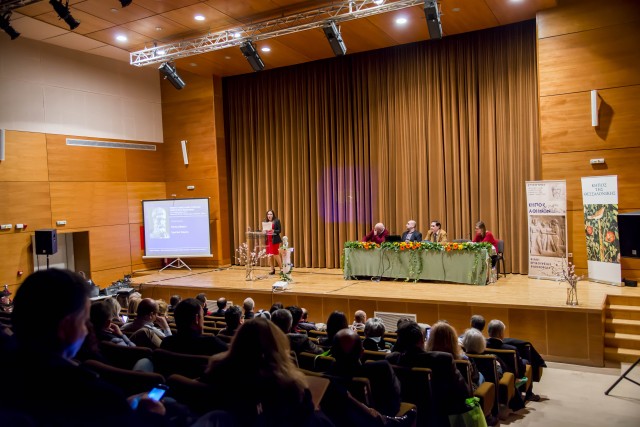

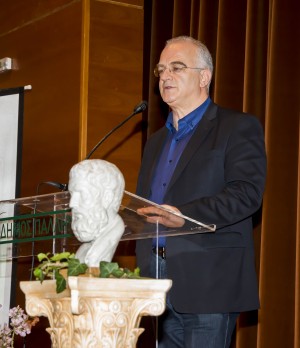 The Mayor of Pallini Athanassios Zoutsos
The Mayor of Pallini Athanassios Zoutsos 
